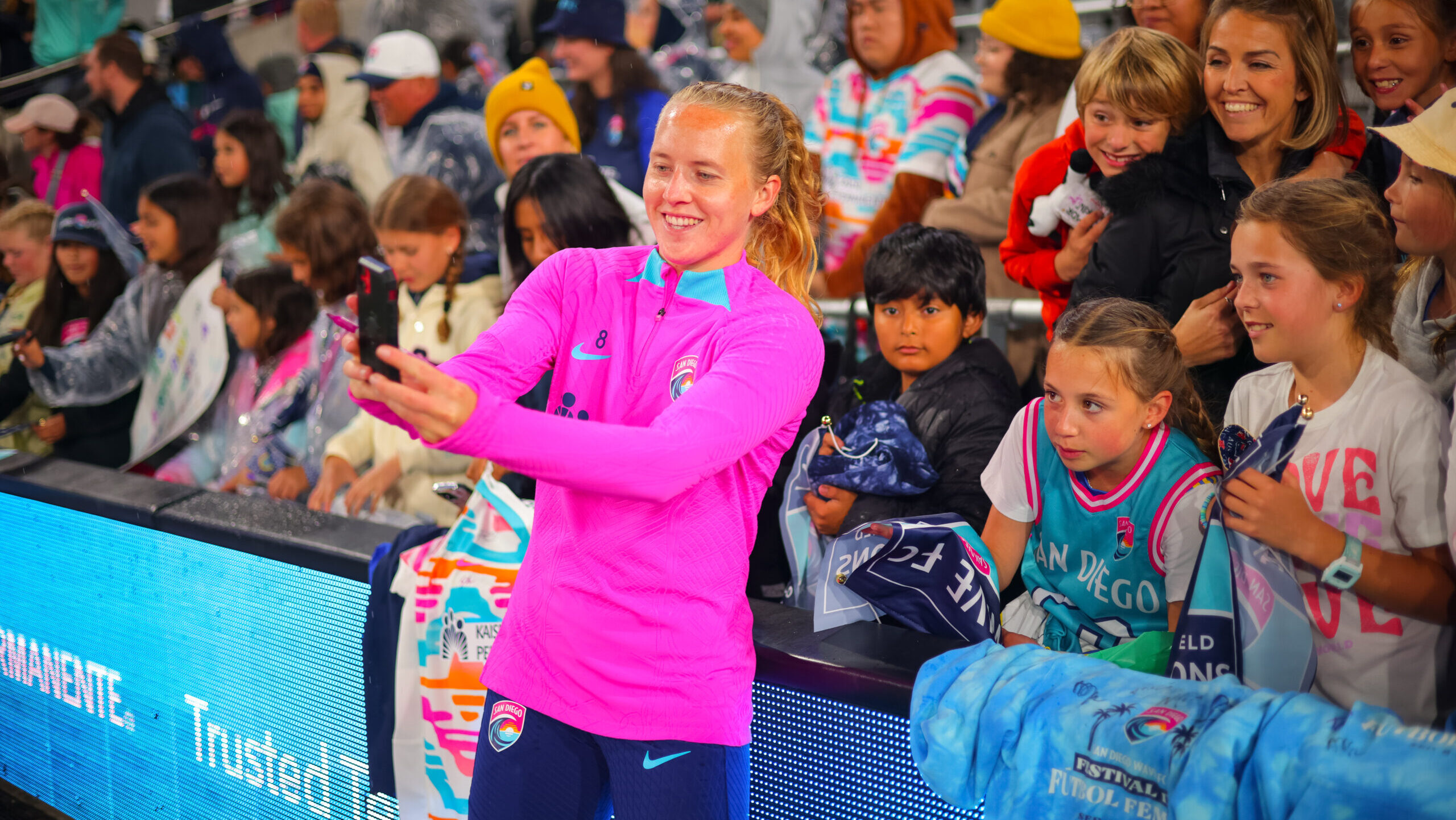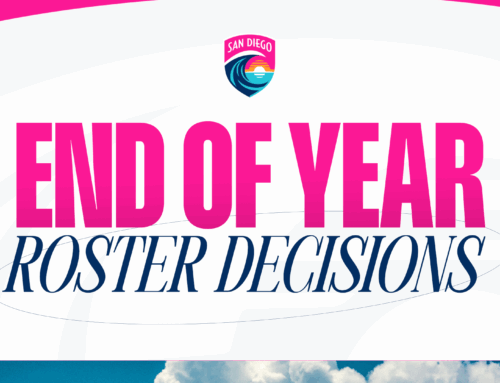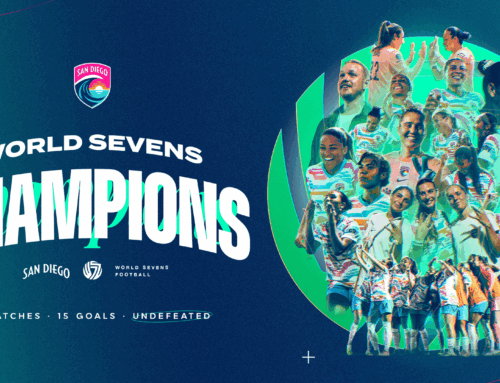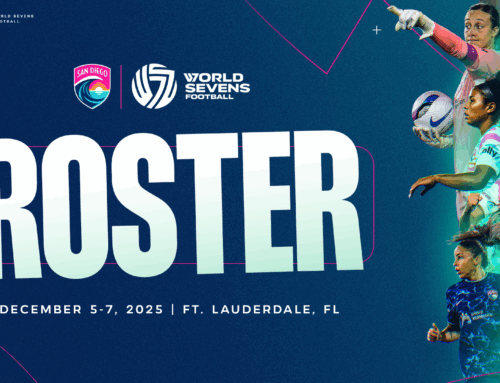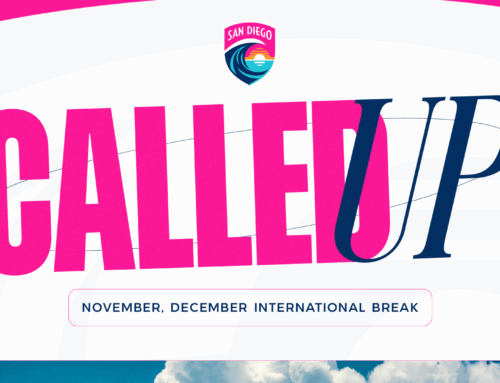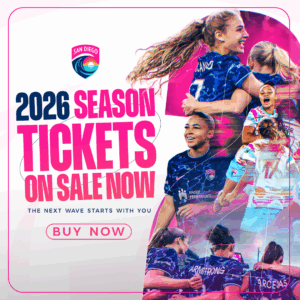May is Mental Health Awareness Month, a national movement dedicated to eradicating stigma, extending support, fostering public education and advocating for policies that prioritize the well-being of individuals and families affected by mental illness.
In recognition of the month, Wave FC midfielder Sierra Enge recently sat down with club reporter Megan O’Keefe to discuss her personal connection to mental health awareness and her passion for providing resources and education and breaking down barriers for those affected and their loved ones.
O’Keefe: Why is mental health, especially in sports, so important to you?
Enge: I lost my friend in 2022 to suicide and from that point on I just started to learn a lot more about mental health specifically within the athlete population.I just think that so often as athletes, we’re taught that we need to push through things, that we need to tough it out, and when it’s something that has to do with your mental health, you can’t do that.
There’s not enough conversations [and] there’s not enough education for practitioners, for coaches, for support staff on how to deal with these kinds of things. I’ve just kind of become passionate about creating spaces to have these conversations and to let athletes be more open and honest and vulnerable about what they’re feeling.
O’Keefe: What allows you to feel comfortable and empowered to have these conversations?
Enge: I feel empowered to have these kinds of conversations just because of other people being vulnerable with me and having these conversations and the impact that that’s had on me.
Unfortunately, my aunt also had the same thing happen to her when she was in college – she lost her best friend. And they shared, her friend and my friend, shared a lot of the same similarities and by her opening up to me and being really honest about her experiences and how she felt, it honestly got me through the whole thing.
Even just in little things of having little injuries or not playing or not getting as many minutes as you want, like having old teammates or friends that open up to me about them struggling with similar things has made me feel like I’m not alone, made me feel like I’m going through this with someone else and so that’s what’s really empowered and inspired me to do that for other people. Just the simple act of being really vulnerable and honest with someone else creates a deep and genuine conversation that you can’t really get otherwise.
O’Keefe: Can you share some information on the new book that is releasing soon that you are involved with?
Enge: So this book is called The Price She Pays and it’s coming out in June. It’s basically just about the challenges that females face from the school yard all the way through college. It just kind of brings to light the systemic issues that are set up and just the way that we can parent girls differently, the way that we can coach girls differently, the way that we can support women differently. I think it just is essential honestly for everyone involved in sports to read.
I think it was eye opening for me to learn more about these stories and just the way that women struggle in ways that you don’t even think about. I’m really excited for the book to come out. I think it’s going to be really eye opening, especially for parents and coaches because I think that there’s a lot to learn about how we speak to people and how we inspire confidence and inspire self belief instead of leading them towards self doubt. And yeah, just struggling with body image issues, things like that, so I’m really excited for the book to come out. I think it’s gonna make a really big change.
O’Keefe: For someone who may be struggling no matter what age, what is your advice to them? Whether something they can do for themselves or resources that you know about that they can seek out.
Enge: Yeah, I think the first thing is, I know it’s hard but to say something because when you’re struggling, people can’t help you unless you do say something. There is now a suicide hotline number 988 – it sounds extreme and it’s there for you whenever you need it. But if there really is anything that’s going on, I would say reach out to that number because if you don’t feel comfortable reaching out to your community, there’s people there that can help you.
I would say for me, something that has been really helpful in times where you don’t feel like your best or you’re struggling with something is to journal. That’s something that’s been really helpful in my career and my experience is it helps me process my feelings, it helps me process my emotions. It kind of helps me feel like I have a friend on the page. If there’s not someone in your community that you feel like you can reach out to, figure out other ways to process those emotions because keeping them in is just not sustainable.
It hurts, it’s painful, it builds anxiety and at some point it’s going to explode. So I would say it’s better to just reach out early, find ways to process those emotions, talk to friends, journal, and if that doesn’t work, then reach out to the suicide hotline numbers or there’s other chats that you can get on online to just have some sort of support.
O’Keefe: How have you seen the conversation around mental health evolve? Especially if you think back to when you were a kid, did anyone talk about it versus how it is now and where would you like to see it?
Enge: Yeah, I think as a kid it was never, ever talked about. Even talking to my parents and my grandparents about it, it’s a very foreign concept to them. I think that it’s a great thing that this conversation is starting. I think that it’s really sad and frustrating that it had to start because we lost so many collegiate athletes and I think that in the future we just need to get into this space where it is less stigmatized because it is a conversation now. But it’s still something as we talked about before that people don’t wanna bring up.
You feel uncomfortable talking about it, it feels hard and in my dream world, it would be a lot easier and it would just be natural for someone to be like, ‘Hey, how’s it going?’ and you say, ‘Oh, I’m ok, but I’m really struggling with this’ and have that be a starter of a conversation instead of tiptoeing around it and maybe not bringing it up. I would love for those conversations to happen.
I would love for there to be more education around just mental health in general – for athletes learning how to talk about it, learning how to express these emotions, learning how to process them, like really building a mental health tool kit. I think also more education around parents and coaches and how they can best support athletes as they go through a pretty hard road. It’s difficult to be a collegiate athlete. It’s difficult to be an athlete at any level – you’re balancing a lot of things. So that’s what I would love to see in the next few years.
O’Keefe: Are there any specific organizations that stand out to you who are creating positive change around mental health in sports?
Enge: I think one organization that’s done a really good job of creating these communities and was actually called, ‘Create the Space,’ by Common Goal. They brought together a bunch of NWSL players right before the season started. We had this three day retreat where we basically got to learn more about each other and also dive deeper into who we are as individuals, really focusing on our identity outside of the soccer fields and then also kind of building that mental health tool kit – ‘OK, how do I talk about my emotions?’ ‘How do I process my emotions?’ How do I have difficult conversations?’ ‘How do I support teammates who are going through something difficult?’. So that was really incredible and shout out to Naomi Girma for setting that up.
I think another organization that’s also doing something really incredible is Female Footballers. They’re just creating a mentorship program so that older athletes and people who are currently playing soccer can connect and mentor younger athletes. All of the mentorship programs are around building mentor tools. I think that’s something that I wish that I could have done when I was 13 years old and feel really lucky to be a mentor in that.
Lastly the Hidden Opponent, they have all these ambassadors on college campuses that are really there to provide support and be a resource for their teammates. I think these organizations are doing something that’s just incredible by creating change and starting in spaces that really need it the most.

